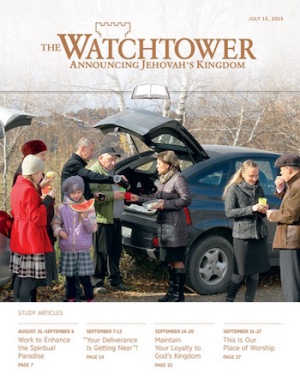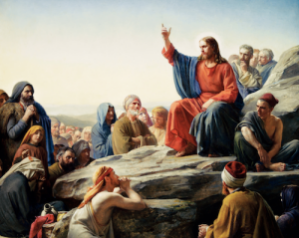Baruq
“Maintain Your Loyalty to God’s Kingdom”
Watchtower’s study article of week 14 to 20, September 2015
True Christians attach great importance to loyalty and neutrality. Jehovah's Witnesses are also known for that. Who was young some decades ago have probably had to deal with imprisonment for refusing to do military service. They had to face the courts to explain their position. Many even had to explain why they refused alternative service while themselves have difficulties in understanding the subject. But faithful to the Society’s guidance, they went before the judges who certainly understand their position towards military service, and some shared their position even for secular reasons, but could not understand the refusal of the civil service. Even if they were hard times, we must recognize that Jehovah's Witnesses in a cell with regular outings, weekly visits from family members and, for somebody, semi freedom that consented to work outside during the day, and thus having a salary, come back home detention only for night, permissions to go to the meetings at the local Kingdom Hall and to return to parents the weekend, was not worse than a common soldier who went maneuvers for any time with a backpack full of pebbles, following orders barked from a superior. Of course, this applies to the most western countries, we know that some of our brethren have faced intense persecution, or worse have died for refusing to take up arms, or maybe just take a card of a party, as in Malawi.
People in general are loyal to their country, tribe, culture or even a sports team. This is felt in the congregations, not just among people who do not share our faith. The Watchtower does well to remind us that we are part of human society, then the way people settle their disputes can touch us closely.
The true Christian does not consider any part of the world as better than another. But imperfection is within us, and it can be difficult to correct certain inclinations.
If we were to retain only one lesson in the following paragraphs, it would be this: let us ask ourselves, "‘What would Jesus have done?". Let us ask ourselves this question every time we have to make decisions in our lives. Especially when it comes to our relationships with our brothers and sisters, but also with those from the outside. Let us remember that Jehovah is the creator of the races, and neither he nor Jesus do consider a race superior to another. This also applies for citizenship, although this is a human institution that was not part of God's plan in the beginning.
On one issue, however, we must take sides—in supporting Jehovah’s universal sovereignty. Controversy first arose in this regard in Eden when Satan challenged Jehovah’s rule. Now, all must decide whether they believe that God’s way of doing things is superior to Satan’s or vice versa. In all sincerity, do I take Jehovah’s side by choosing to obey his laws and standards instead of doing things my own way? Do I see his Kingdom as the only answer to mankind’s woes?
At this point of the study, we would have appreciated a clarification from the Society about the agreement between the Watchtower and the UN during 10 years. On October 8, 2001, Stephen Bates, the religious affairs correspondent for The Guardian newspaper in London, originally broke the story revealing the Watchtower Bible and Tract Society was registered with the United Nations Department of Public Information (DPI) as an officially recognized NGO (non-governmental organization). Unbeknownst to millions of Jehovah’s Witnesses, it turns out that the Watchtower had been secretly affiliated with the United Nations for nearly a decade.
No doubt anticipating a tsunami wave of criticism and perhaps even an official UN investigation, the Watchtower quickly requested that its NGO affiliation with the DPI be terminated. Shortly afterwards, Paul Gillies, the Watchtower’s spokesman in London, released a statement to The Guardian saying that it had been necessary to register the organization as an NGO so that Bethel’s research staff could have access to the Dag Hammarskjöld library at the United Nations headquarters in New York City, and that was all there was to it. However, following the anticipated flood of inquiry from Jehovah’s Witnesses around the world—many of whom read the story on the Internet—a few weeks later the Governing Body also issued a more detailed “explanation” to inquiring Watchtower field offices. The official branch letter implied that the Watchtower’s NGO relationship was not secret at all. In the opening sentence the Watchtower states:
Because of published allegations by opposers that we have secret links to the United Nations, a number of branches have inquired about the matter and we have replied.
In view of the fact the Watchtower has never publicized its NGO connection to the UN in any of its publications, prior to the Guardian exposé none of Jehovah’s Witnesses in the field were aware of the relationship—not even numerous branch overseers of the Watchtower, who themselves inquired about the matter. Surely, then, it is disingenuous for the Governing Body to causally dismiss the matter as being mere “allegations by opposers that we have secret links to the United Nations.” Even to this day the vast majority of Jehovah’s Witnesses are still unaware of the NGO affair.
Contrary to their carefully crafted press release, the Watchtower’s connection to the United Nations was, and in many respects still is, secretive. (e-watchman.com)
We do not want to twist the knife in the wound, but let us be sincere: If a Christian Jehovah's Witness as part of his employment were to register with a political party, even without sharing the principles, could he continue to enjoy privileges within the congregation? And what about the thousands of victims in Malawi, persecuted for just have refused to take a membership card of the ruling party?
That is why we would like to tell the Governing Body of the Watchtower: “Train yourself to be loyal to jehovah".
Despite the trials that await the Organization and the doubts that may attack us, being God for a while tolerate it, we do not want to reject Jehovah's Temporary arrangement, that is to say the Watchtower that allowed millions of human to experience the Sovereign Lord of the universe, bringing them together in an organization in which we want to say: "Look! How good and how pleasant it is for brothers to dwell together in unity!". (Psalm 133: 1)



